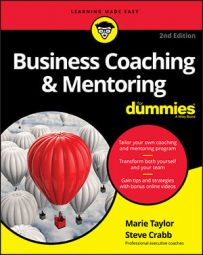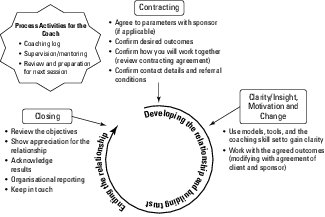Others suggest that professional coaching is a dark art requiring several rites of passage, years of inner soul searching, and the ability to demonstrate 25 models of best practice before you can truly call yourself a coach or mentor. If you’re looking to train or want to hone your skills, do your research on the training available. Be clear and specific about what you want to learn and research the quality of the course and experience of the trainers.
Choose training that encourages you to coach for a significant part of the training. Have clear outcomes, practice standard and supervision/mentoring to help you notice your own practice, and get support when you hit issues that are beyond your experience.
To be a great coach or mentor in business you need- To come from a place of
- A growth mind-set
- Respectful engagement with a client even when he’s not at his best or respectful toward others (including you)
- Emotional resilience and a willingness to recognize when you’re out of your depth
- Accountability for your own personal well-being
- Empathy and sympathetic understanding without joining in with the emotional roller coaster of your client’s journey
- Self-reflective assessment and the desire to experiment, play, and do more of what works
- Absolute focus on your clients and a desire to serve them
- To understand
- That people learn and develop self-mastery in different ways, and you need to adapt to them
- That motivation theory is about belonging, not bucks
- How business works and the context of that industry
- The processes and functions involved in running a business and the language that business uses
- How personal change and transformation happen
- How organizations develop and change
- To be able to
- Give feedback in a constructive way to help your client rather than look clever and insightful
- Define clear outcomes and be flexible enough to move with your clients’ needs as they change
- Manage your personal boundaries with a number of players
- Maintain confidentiality even when the person paying the fees really, really wants to know what’s going on inside the coaching
- Think big picture and small chunks
- Challenge in order to help the client, not just for the sake of it
- Think purposefully and creatively
- Be comfortable with ambiguity and conceptual thinking
- Use the coaching skillset flexibly and be prepared to keep adding to the toolkit to have a wide variety of skills and techniques to deal with a range of client needs
- Know when you’re not the right person to support the individual or group at this time
- Refer someone to another helping service when he needs something beyond your experience, skills, and boundaries
- Run your own business practice well and make a great living doing what you love
Choosing a coach or mentor
In the real world of professional coaching and mentoring, you can find people with months of training but limited experience and some with lots of experience but little training. The research highlights two things in relation to coaching and mentoring outcomes:- No positive correlation is shown between the length of time a person has been qualified as a coach and coaching outcomes.
- Even less correlation is shown between the fees someone charges and coaching outcome.
If a prospective client asks how you’ll manage the relationship, you can show him something like the framework below, which shows a typical framework and the elements usually included. (This is the framework Marie uses.)
When interviewing a prospective coach, business owners look to see if he’s a good fit for you and your organization. Two great questions to ask are
- Who would your ideal client be and why?
- What sort of client would you not work with and why?
Becoming a business coach or mentor
If you’re an experienced life coach or mentor with little experience of business, our suggestion is: Get some experience in business. Work in one, run one, or create your own startup. No matter how much time you spend reading business books, you won’t be equipped to work as a business coach without real-world experience. You need to understand the functions of business, language, roles, and duties, particularly in director-level coaching.If you’re an experienced business executive who wants to become a mentor, get some training in using the coaching skillset and in understanding how to develop mentoring relationships and contracting. You need to learn how to avoid telling someone the answers that you can generate because of your experience. When you offer an answer from your own experience, a client will acknowledge and even agree with you; when the client generates the answers himself, he takes ownership of the insights he gets and is more likely to act upon them.
Get clear and specific on what you’re offering in terms of expertise. If you’re known for your stellar track record in winning large scale government contracts in the United States, you could probably learn to mentor around that easily. Mentoring on cross-cultural contracting in the grain markets of Africa and Asia Pacific may be a stretch, though.
If you’re neither experienced in business nor an experienced coach, spend time in business deciding on the kind of environment you like and feel comfortable in. Discover how to develop the coaching skill set to facilitate people within that. It sounds simple, but we’ve seen many coaches who have been “trained” to believe that all they need to do is six weekends of training, and the world of coaching and mentoring is their oyster. That may be enough for securing a few clients for life coaching, but it’s rarely sufficient in the world of business and executive coaching.

